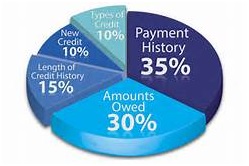
A credit score is a principal factor that lenders consider when you apply for a mortgage. It may be disconcerting that home ownership hinges, at least in part, on a hard-to-remember number. There are different types of mortgages from which to choose.
Each of the major programs has a minimum credit score requirement. This table lists four mortgage types, and the minimum credit score required.
| Type of Mortgage | Minimum Credit Score |
| VA | No Minimum |
| FHA | 500 |
| USDA | 580 |
| Conventional | 620 |
You must know a little about how the mortgage industry functions to understand how written in stone credit score requirements are. Most mortgage lenders do not plan on keeping your loan. Many times your loan will be sold to another mortgage company.
Government-sponsored entities such as Freddie Mac and Fannie Mae or banks like Wells Fargo may be the ones who take over your loan. The lender considers the mortgage to be a product. The entities that buy mortgages each have acceptance standards of their own.
Minimum credit requirements are part of the standards. They do not want to take over bad mortgages s
Lenders offering USDA and FHA loans have their hands tied from the beginning. The home buyer cannot get a loan without meeting the minimum credit score requirement. Because mortgage lenders view the mortgage as a product, individual lenders can have different, stricter standards than those listed in the table -Called Lender Overlay. Extra requirements are injected into the process that is above the minimum for a particular mortgage type. Investors won’t want to buy loans from a bank that continuously sells bad loans.
Since banks don’t want to write a bad loan, they are more cautious and have stricter standards. Stricter lending requirements guarantee a better product for buyers of the loans. Since 2008, lenders are under more regulations and scrutiny.
Impact of your credit score
Credit score not only affects loan approval but has an impact on the terms of a loan too. In addition, your credit score dictates the mortgage interest rate. The lower the credit score is, the higher the interest rate will be.

Lenders view a borrower with a low credit score to be a risk. They fear missed payments or
An FHA loan may require a 3.5% down payment when the credit score is at least 580. A credit score between 500 and 579 may require a 10% down payment. The credit score also impacts the type of house the borrower can get. A bigger down payment due to a low credit score may mean the borrower has to focus on a cheaper home.
Some Good News
The credit score is one piece of information lenders use to consider approving a mortgage. Another important factor is the loan-to-value ratio. Having a large down payment makes the loan-to-value ratio smaller. When a large chunk of it is paid, default on the loan is seen as less risky. Lenders might be willing to approve a mortgage for a borrower who has a healthy down payment.

The debt-to-income ratio measures gross income that is used to pay debt each month. The chance of default increases with each obligation. Lenders are more likely to approve a mortgage when the debt-to-income ratio is less than 43%.
If you have money that is not tied up and can be accessed, such as checking
Employment history and current income are of significance to lenders. They want to be assured monthly cash flow and steady employment will allow for the mortgage payment. Freelancers and self-employed individuals usually have to submit two years of tax returns to verify income.
By improving credit scores, paying down debt, and saving for a substantial down payment, the chances of bolstering mortgage approval are increased. It takes time and hard work to improve a credit score.
Credit Score Calculation
You should know what goes into the calculation. There are different kinds of credit scoring models. The most common used by lenders for a mortgage loan is the FICO score. The breakdown of a FICO score is as follows:

As you can see, the biggest factor is making payments on time. The easiest way to accomplish timely payments is to set up auto pay for bills. Post reminders on the calendar or an area sure to be seen as a reminder.
The second biggest factor in determining a credit score is the amount of debt owed. It is beneficial to take care of debt as soon as possible. At least strive to get below the 43% of income mark.
You save interest payments, the credit score improves, and the debt-to-income ratio drops. The ideal situation makes you eligible for better mortgage loan rates. An efficient way to pay off debt is to focus on high-interest debt such as credit cards first.
All accounts are used to average the length of credit history. Older accounts are beneficial. It’s important not close old credit card accounts unless they have an annual fee attached and are no longer being used.
Avoid new credit cards and loans if possible. They decrease the average credit history length and ding the credit score. Each type of loan or credit is either called Revolving or Installment.
Credit cards are revolving credit. Personal, auto, and student loans are installment loans. A new type of credit boosts the score slightly. The mix is only ten percent of the credit score. It is generally not advised to take on a debt you don’t need.